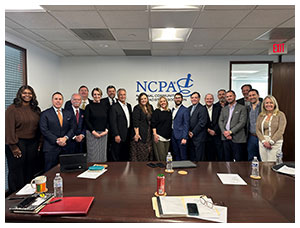Dear Colleague,
 Last week, NCPA was proud to host a meeting of pharmacy organizations with staff in Washington, D.C., to discuss advocacy strategy and messaging around top priorities for community pharmacy. They included the American Pharmacists Association, the National Association of Chain Drug Stores, American Pharmacies, the Compliant Pharmacy Alliance Cooperative, the Independent Pharmacy Cooperative, and Pharmacists United for Truth and Transparency.
Last week, NCPA was proud to host a meeting of pharmacy organizations with staff in Washington, D.C., to discuss advocacy strategy and messaging around top priorities for community pharmacy. They included the American Pharmacists Association, the National Association of Chain Drug Stores, American Pharmacies, the Compliant Pharmacy Alliance Cooperative, the Independent Pharmacy Cooperative, and Pharmacists United for Truth and Transparency.
 With legislation so close to passing that would be a major step forward toward NCPA's goal of changing the pharmacy payment model, it's imperative that the message on Capitol Hill moves in the same direction, at the same time, with the same intensity. Nothing pleases the PBMs and their big Health Insurance overlords more than seeing conflicting messaging coming from community pharmacy advocates. At stake are Medicaid payment reform and an important first step in Medicare payment reform.
With legislation so close to passing that would be a major step forward toward NCPA's goal of changing the pharmacy payment model, it's imperative that the message on Capitol Hill moves in the same direction, at the same time, with the same intensity. Nothing pleases the PBMs and their big Health Insurance overlords more than seeing conflicting messaging coming from community pharmacy advocates. At stake are Medicaid payment reform and an important first step in Medicare payment reform.
It's critical that our strategies are complimentary, and that our messaging is consistent. In my experience at NCPA, when the message is inconsistent, it can bite—hard. In 2003, Medicare Part D is a case in point. NCPA strongly opposed it to the bitter end because it handed the program over to PBMs. Unfortunately, other advocates took a different position, which put just enough doubt in lawmakers' minds for it to be jammed through in the middle of the night. I've always said that we are individually strong, but collectively, community pharmacy is a powerhouse. Last week, the groups tuned up that powerhouse.
And the timing couldn't be more important. We are in a stronger position to win key victories than at any time I can remember. Rep. Brett Guthrie (R-Ky.), a longtime supporter of PBM reform, is the new chairman of the House Energy and Commerce Committee, which oversees much of the U.S. health care system. Rep. Buddy Carter (R-Ga.), a pharmacist and tireless patient champion, now chairs the House Energy and Commerce Subcommittee on Health. And, we still have strong bipartisan support in both chambers.
Robert F. Kennedy, Jr., President Trump's nominee to head the Department of Health and Human Services, hasn't been confirmed yet, but during his confirmation hearing he explicitly supported PBM reform. His nomination will soon go to the full Senate for an up-or-down vote. President Trump has said multiple times, including recently, that he would focus on "getting rid of the middlemen," whom he pointed out "make more money than the drug companies." We intended to remind him of that frequently.
Also in our favor is the fiscal landscape. The Trump administration and Congress will be desperate for savings, and our reforms would save billions. As this one-pager shows, NCPA's priority bills would reduce federal spending by nearly $5 billion, according to the Congressional Budget Office. (Yes, we have let the Department of Government Efficiency know!) They would also preserve patient choice and save countless independent pharmacies from having to close their doors.
Of course, the PBMs and the big insurance companies will rev up the money machine again and try to blanket Washington with propaganda. But it can't stand up to the truth. In the last two years, tens of thousands of NCPA members and patients sent letters to Congress, testified in committees, submitted comments to regulators, and spoke to news outlets about the predations of PBMs and insurance companies. With community pharmacy united by common goals and consistent messaging, real gains are clearly within reach.
Sincerely,

B. Douglas Hoey, Pharmacist, MBA
NCPA CEO
